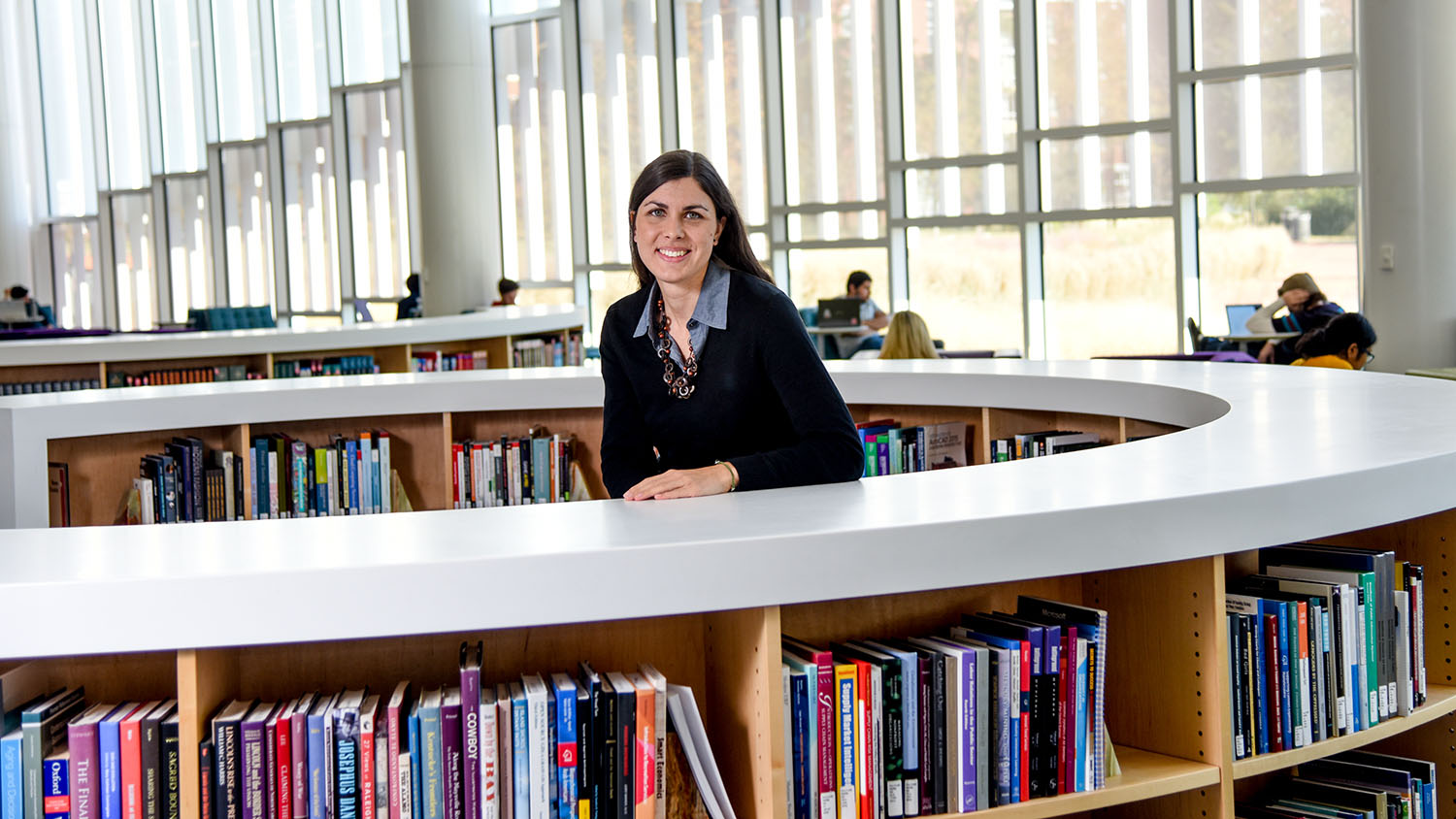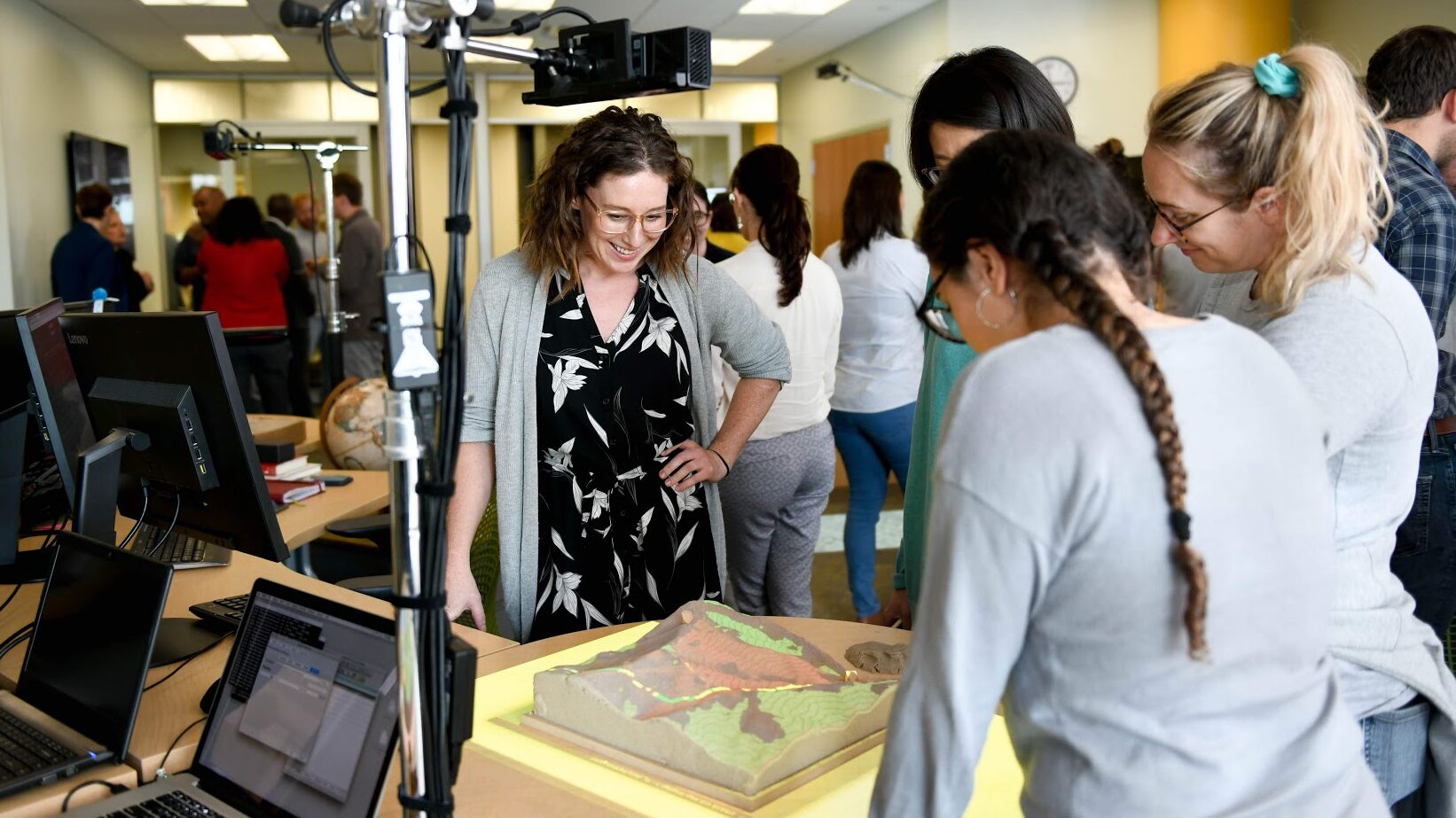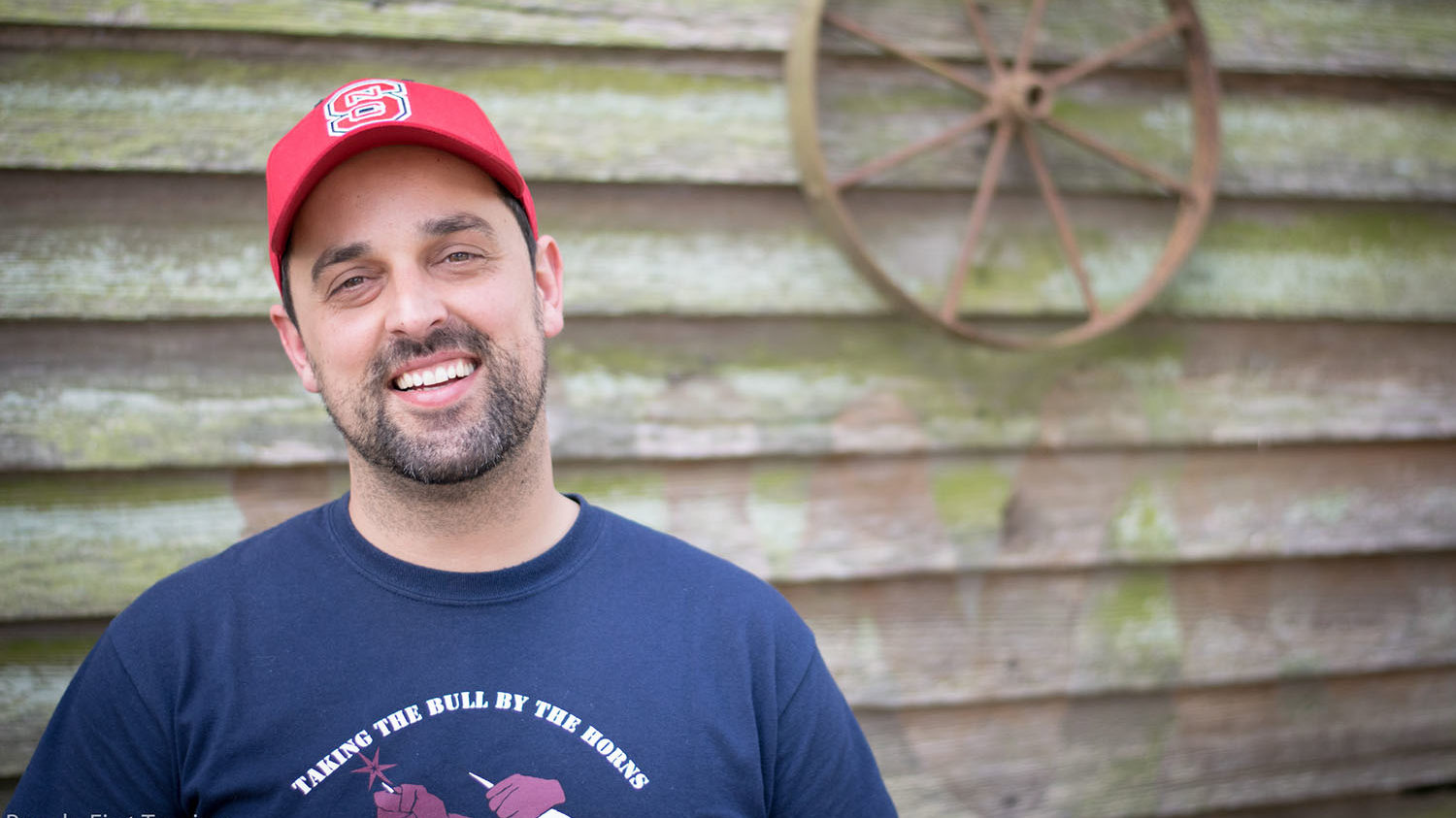Magdalena Sorger

Evolution of a Would-Be Businesswoman into a Scientist
In 2006, Magdalena Sorger was just starting her last year at the University of Economics and Business Administration
in Vienna, Austria, her place of birth. “I was focused on my goal to have a career in business as a management consultant in a big company and earn tons of money. And then I went on my exchange semester to the University of Illinois Urbana-Champaign and decided to take a biology class in addition to my business classes, just out of curiosity, to get a glimpse of a different field since that is not something the Austrian university system typically encourages.”
There is a sense of deep joy in Sorger, having battled her way from being pegged joylessly in business to life as a scientist. She had to overcome a lack of scientific background to win her place within the scientific community at NC State—plus, she had to win over her parents, who presumed she would follow in her father’s footsteps in business management. This is her story.
Magdalena Sorger has a picture of herself wearing a smart, conservative business suit, looking officious and somber. In the picture, her dark hair is smoothed and her expression is all business. The image was taken circa 2008, just before she graduated from business school with an MSc in International Business Administration. For contrast, she shows another of herself after she abandoned the pursuit of business.
In this picture, Sorger looks every inch a scientific adventurer, wearing safari-beige and green garb, a backpack and standing in a forest, as if she was caught mid-frame in a Wild Kingdom documentary. Her hair is pulled into a messy pony tail; you can see the sweat beading on her skin and can taste the peculiarly acrid taste of life in the wild. She hasn’t bathed in a few days. She probably hadn’t slept much either, on the hunt for trap jaw ants. Sorger beams joyfully in this shot.
“I’m so happy,” she says—and not only because she is celebrating the completion of her doctorate. She is living a dream and has reimagined her life.
She grew up in one of Europe’s most renowned cities and was three courses away from an MBA degree and a life in management consulting. There was the allure of financial success and all the trappings—an expensive car and apartment. But the powerful tug of an animal behavior class taken during studies in the United States, her favorite classroom experience ever,
changed her destiny.
“It was the best class I had experienced, but not in my field…there was a moment in this class that stood out. They showed the ants (trap-jaw ants) flying in the air, jumping backwards.” After class she waited to talk with the lecturer. Sorger was enraptured—she felt something she had never known in former classes, discovering in this one elective course how much she was intrigued by science.
Sorger also describes her affection for America, with its sense of adventure, discovery, and even pop culture. (As a teenager she liked the film American Pie.) By the time she was 17, Sorger already knew the words to the American anthem, and memorized all the American capitols following an American holiday with her parents.
But thanks to that science class, she was also positively in love with ants. “Ants,” she chortles. “I couldn’t explain it.”
But was she in love with business? Not so much.
“All of this went hand in hand with self-discovery,” she marvels. “I don’t know if I found the ants or the ants found me. A friend said to me, when he heard I switched to ants, ‘I thought it was interesting you chose something so unpopular when you are so driven.’ I told him, it chose me.”
Sorger found through the study of ants what she loves best.
“Towards the end of the class, the teaching assistant said, ‘Let’s stay in touch.’” She was 24 and still had a business thesis to complete. After completing her studies, Sorger also traveled with friends for nearly three months to visit Hawaii, Yellowstone Park, and Las Vegas, ending her journeys in Montreal. During these trips she paid greatest attention to insects.
“I took pictures of them…I found ants and spiders interesting. And then, at some point,” she snaps her fingers, “something happened. And when I looked at an ant, it did something within me. The best way to explain that is love.” She laughs heartily.
In 2008, after finishing her master’s, she joined an expedition to a research station in northern Guatemala. “The ant diversity was way beyond anything I had seen. I was in a bungalow with no electricity or light…doing field studies.” And Sorger was euphoric, collecting ants and beginning to grasp how much she would need to learn to conduct research. “I saw army ants; and trap jaw ants. I was jumping around—this animal I’ve learned about, here it is! In my hand!” She visited Mayan ruins , and went off to do other things with guides, including a two-day hike into the jungle.
“There in Guatemala, I knew I always liked the idea of being like Lara Croft or Indiana Jones, but I didn’t know if I would be cut out for it. Then and there, I knew I was, I loved it…I was so in my element. So I came back to Vienna — with all these insects I had collected…and had no time because I’m in this internship, not yet making money. And I think that was good because I could have been distracted by money.”
Sorger remained in touch with the Illinois teacher who had ignited her scientific passion. “Chris Smith, the teaching assistant, put me in touch with people. I wrote about 15 professors at universities. I told them I loved ants, I want to come study…I guess at that point, the decision happened. I was scared to tell my parents and friends. My father is a very serious, career-oriented person.” She found entry into the scientific community at NC State.
And yet, Sorger decided she had to tell her family. Her friends were incredulous.
“I think they thought I was crazy. In general, my mom reacted like a mom: what makes you happy makes me happy. My father is from a generation when getting an education was a privilege. He’s a realist…in addition to worrying about money.” But Sorger was adamant. “What had happened at that point was, I didn’t care about money anymore.”
Three years later “with a great deal of passion and determination to study ants for the rest of my life, two years of learning and working at the Natural History Museum in Vienna, a year of basic biology classes at the University of Vienna, a trip to Guatemala and Borneo…I’m a biologist, exploring the tropics, chasing around ants in the jungle, answering exciting science questions,” she says proudly.
Sorger eventually left Vienna behind, famously one of the world’s most livable cities (recently voted among the top three) and also a sure-fire money-making life as a consultant to find fulfillment and a dream fulfilled as a scientist in Raleigh at NC State. For her, this was a paradigm shift, a triumph and the realization of a passion. It was also a chance to prove
sometimes life offers second chances, and sometimes it is worth it to make the sacrifice to change direction.
Her final doctoral topic was “On ants, islands and evolution,” she explains proudly. “I got lots of nice feedback.”
Was it easy? No. Was it vital to her fulfillment? Yes.
“I just presented my work,” Sorger announced, with a huge smile last November. The Rubicon passed, she reflected from a meeting room in the Hunt Library. Sorger, now age 32, wore a black shirt, red pants and boots rather than the business suits she formerly wore.
“For the first time, I understood the impact of my work within the scientific community. I felt the shift from looking up to them and learning from them…I became a colleague and built that self-confidence.”
Her new-found self-confidence was a giant leap from the end of her third year as an NC State graduate student, when Sorger developed stress-induced physical pains in her chest prior to her preliminary examinations. She had felt extreme pressure to catch up on a number of science courses in order to qualify as a doctoral student. That pressure dogged Sorger.
She tackled the confidence issue and volunteered for scientific lectures. Since then, Sorger has given frequent lectures to general audiences here and overseas, coming to love opportunities to discuss ant research.
“When I go back to Vienna I’ve given talks at the Natural History Museum, which is so old it was built before electricity. I have also given a talk at the Daily Planet in the Nature Research Center in Raleigh.” All of which, she says, helped her in her doctoral defense preparations.
Encouraged by successful speaking experiences, Sorger explains her doctoral research by talking about islands, and what makes them interesting as systems, weaving in the work of evolutionary scientists Charles Darwin and Alfred Russel Wallace. Her work followed their lead, in realizing how ecological systems shape natural selection. “Islands are not just ocean surrounded, but can also be a lens through which we see things—cities as islands, and city parks—on different scales.”
As Sorger laid out her academic defense, she built the progression of her research as if sharing a research journey around the world. Her thesis chapters tied into Florida, Borneo and Ethiopia, each places with island-like systems where she has gathered research.
“In Florida, I studied ancient sand ridges that at some point corresponded to shore lines. These ridges are like islands because they have been isolated for a long time and now have unique ecosystems. There is an ant species that only occurs on two ridges and could have been separated for up to a million years.”
Sorger knows she has career options in academia, a museum setting, or a research institution, given her additional business background. “When I started, it was from a perspective of business is bad, biology is great. But as I’ve gone on, I realize if I had done things the other way around, I would have wound up in the same place. I also see my mission and purpose. This is how I can connect with people. The challenge (now) is to find the job that lets me be the most useful but in a purposeful sort of way.”
Her parents came to NC State for her final doctoral defense, which was held in Gardener Hall. Sorger talked for nearly an hour as her visiting parents watched proudly. “It felt great.”
She says she is deeply grateful to them and to others within the academic world who nurtured her dream when it looked nearly impossible. In an online post, she wrote:
“I couldn’t have done it by myself, when I was armed with nothing but my passion for ants. I had amazing support from people who believed in me, facilitated, encouraged and taught me. Dr. Herbert Zettel (Natural History Museum Vienna), Dr. Chris Smith (Earlham College, Indiana), Dr. Martin Pfeiffer (National University of Mongolia), Dr. Andy Suarez (University of Illinois Urbana-Champaign), Dr. Rob Dunn (North Carolina State University). Thank you.”
But Sorger herself has undergone an evolution of her own, and successfully segued from a life as a businesswoman to life as a grateful scientist. Today, she holds the freshly-earned doctorate to prove it.
Read more from the Graduate School’s Think Magazine.
Download this article as a PDF.
- Categories:


